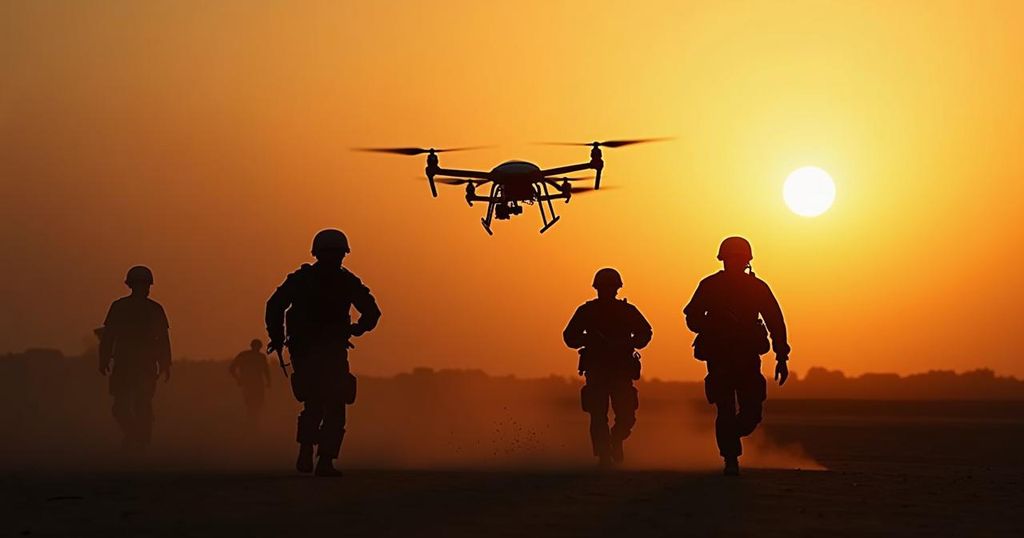On Friday, two Israeli soldiers were killed in a drone attack from Iraq, attributed to the Islamic Resistance in Iraq. The strike occurs amid escalating tensions in the region, particularly between Israel and Hezbollah. Iranian Supreme Leader Ayatollah Khamenei characterized recent attacks against Israel as legitimate, stressing the ongoing military confrontations could have broader implications for global economics and regional stability.
The Israel Defense Forces (IDF) confirmed that two Israeli soldiers were killed following a drone attack originating from Iraq while stationed at a northern army base in Israel. The Iranian-backed group, the Islamic Resistance in Iraq, has claimed responsibility for drone strikes on multiple targets in Israel, particularly in the Golan Heights and Tiberias. However, it has yet to be established whether the drone strike that resulted in the soldiers’ deaths was linked to this group. This incident occurs amid escalated hostilities in the region, highlighting the ongoing conflict between Israel and Hezbollah, which resulted in over a hundred fatalities in Lebanon the day prior. Amid this turmoil, Iran’s Supreme Leader, Ayatollah Ali Khamenei, described the recent attacks against Israel as “legitimate” in a sermon, positioning these actions within the framework of retaliation for Israeli actions deemed aggressive by Iran. Additionally, U.S. military forces conducted airstrikes against Houthi targets in Yemen, further indicating the complex web of military confrontations in the region. Reports indicate that four Lebanese medics were killed due to Israeli airstrikes, underscoring the severe humanitarian impact of the conflict. Moreover, the IDF reported that a total of nine Israeli soldiers have died due to the ground operations against Hezbollah, which involve intense and dangerous combat conditions. The current conflict not only involves direct military confrontations but also escalating rhetoric from Iranian officials, with calls for a shared defense among regional allies against perceived aggression from Israel. This comprehensive conflict landscape reveals the intricate and perilous nature of the Middle East’s geopolitical dynamics, necessitating careful consideration of the evolving situations and potential resolutions. Furthermore, with oil prices rising due to market concerns about a broader conflict impacting energy supplies, the implications of this conflict extend beyond region-specific consequences and pose risks to global economies.
The recent drone strike that killed two Israeli soldiers reflects the heightened tensions and escalating violence in the Middle East, particularly between Israel and Iran-backed militant groups. The Islamic Resistance in Iraq claims responsibility for these strikes, which typically aim to target Israeli assets but have rarely succeeded in causing significant damage. This particular incident marks a critical escalation in ongoing hostilities, with the backdrop of Israel’s ground operations against Hezbollah in Lebanon, which have resulted in extensive casualties and widespread evacuations. Amid these tensions, rhetoric from Iranian leadership further complicates the situation, painting the current hostilities as part of a broader struggle against Israeli aggression. This comprehensive conflict landscape includes U.S. military actions targeting Iranian proxies while also affecting global commodities such as oil, raising fears of economic ramifications if regional conflicts escalate.
In conclusion, the deaths of the two Israeli soldiers due to a drone attack mark a significant escalation in an already volatile environment characterized by intense military engagements and aggressive rhetoric among regional powers. The situation underscores the intricate interconnectedness of hostilities in the Middle East, involving not just direct confrontations between Israel and its adversaries but also implications for global economics, particularly the oil market. The ongoing military operations, claims of legitimacy by Iranian leaders, and the complex dynamics involving U.S. military support for various factions highlight the urgent need for diplomacy and conflict resolution strategies in this region.
Original Source: www.newsweek.com






